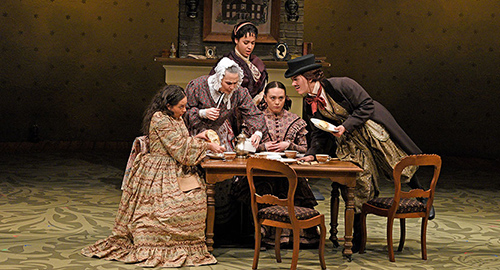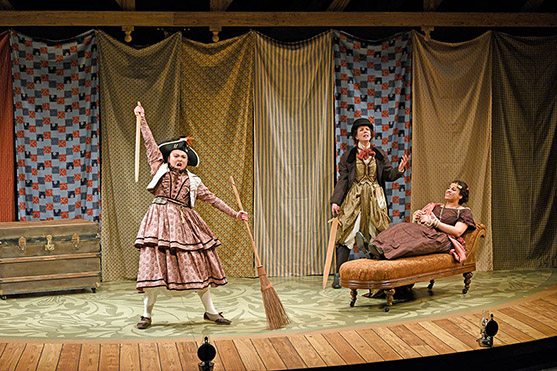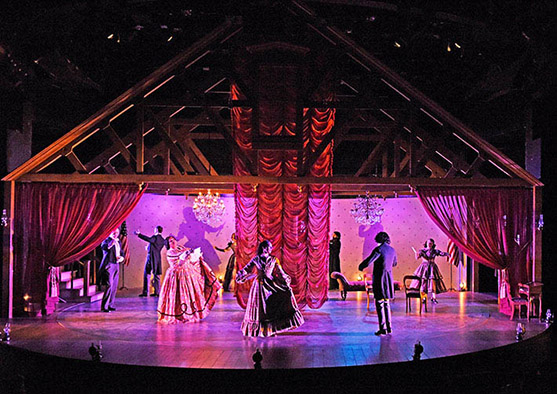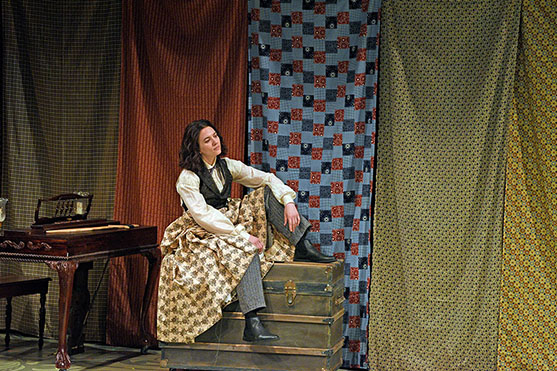by tom andrew –

The Old Globe in San Diego will present a new stage version of the classic Louisa May Alcott book Little Women. This version penned by actress and playwright Kate Hamill is having its West Coast premiere.
Hamill has had much experience and great success in taking classic books, like Pride and Prejudice and Sense and Sensibility, to the stage. Little Women is just one more classic she is tackling.
One thing she does when writing and getting these shows up and running is keep away from other recent renditions. That means that she hasn’t seen the latest film version.
“I haven’t seen Greta Gerwig’s Little Women!” Hamill said. “I try to stay away from other versions of things I adapt, until I’m really, really done with my own – just because I don’t want to be influenced by other people’s ideas! I hear hers is great; I just need to avoid it until I know, for sure, that I won’t be tinkering with mine. I think this play will be a different version of Little Women than they’ve seen in movies, though.”

The book has had many film, television and stage versions, and has been a staple for many girls for years. The book is now 150 years old and will very likely be around for another 150 years. Hamill also read the book when she was younger.
“My mom gave me Little Women when I was entering puberty, which is really when young women start smacking against the dictates of society,” Hamill said. “I wanted to tackle adapting it for the stage because I felt like there was a tremendous opportunity to do something new with it. I knew that a lot of families would be seeing it, and I wanted to create a piece that showed LGBTQ+ teens and young people that they have ALWAYS had a place in American stories, that their stories are universal and needed. I wanted to make a piece about the constrictions of gender roles.
“I take a radical approach to adaptation,” she said. “I approach it very much as a new play written in collaboration with another author, albeit one who is currently dead – and Alcott herself was arguably not straight and certainly chafed in her gender role, and I wanted to create a new play that, I believe, she would have supported. I also, very implicitly, wanted to create an inclusive Little Women – you cannot, in any production of this play nationwide, cast all white people; you must cast the Marches in an inclusive manner – which allows everybody in the audience to feel that they can see themselves reflected onstage.”
Hamill, like so many women of today, realize just how unfairly they have been treated over the years on stage, behind the camera, in front of the camera, and in their roles of playwright and stage director. All too many times they have been passed up and watch their chances go to men. Hamill feels strongly that there are not enough leading roles for women, and she is not alone.
“I knew that a lot of families would be seeing it, and I wanted to create a piece that showed LGBTQ+ teens and young people that they have ALWAYS had a place in American stories, that their stories are universal and needed. I wanted to make a piece about the constrictions of gender roles.
— KATE HAMILL
“I was working as an actress; I still work as an actress,” Hamill said. “I was deeply frustrated by how often women were relegated to only playing tertiary characters in male-based narratives: wives, girlfriends, prostitutes. There are some great roles for wives, and girlfriends, and prostitutes – but when women are pushed to the sidelines over and over again, there’s something wrong. This is especially true in the classics – and the classics are cultural touchstones for us, they shape our whole worldview.
“Frankly, male playwrights were almost exclusively the only ones getting produced, for millennia, and they’ve been controlling the narratives,” she continued. “Our stories are all too often filtered through the male gaze. So, I wanted to start writing new, female-centered, feminist classics that don’t ask for that kind of approval, that break out of those structures.”
“I wanted to make roles for complicated, funny, spiky, vulgar, very human women as well as men. I wanted to make ensemble-based plays that brought something new, that took a radical new play approach to adaptation. Honestly, when it comes to the classics, I didn’t come to decorate the doors of the palace – I came to kick down the doors and let all the people in.”
Hamill’s version of the show just finished a run and now will open at The Old Globe on Thursday, March 19. The cast of the Dallas production will be here as well, and playing the role of Jo March will be Pearl Rhein, who is very familiar with Hamill’s work.
“I’m a huge fan of Kate’s work,” Rhein said. “Her characters and dialogue are never-ending gifts to actors. She writes dialogue that you read as an actor and instantly want to say out loud. This is my first time getting to do one of her adaptations, and I’m hoping to work my way through her catalog.”

Rhein, like Hamill, said she hasn’t seen the latest film version because “it becomes too difficult to find a character with someone else’s performance in my head.” However, she did see the Katharine Hepburn version many years ago and is fighting to not let Hepburn slip into her character.
Jo March is the very strong-willed daughter in the March clan and in some ways has been an icon and hero to many girls and women over the years, including Rhein.
“I think Jo is a prototype for many of the misfit girls in literature,” Rhein said. “Harriet in Harriet the Spy, Anne Shirley in Anne of Green Gables, Celie in The Color Purple, Hermione Granger in Harry Potter are all strong but underestimated characters that many people grew up with. (They’re also, along with Jo, all characters who are judged ‘not pretty enough’ in one way or another.) When I was growing up, Jo was someone who helped me see that I wasn’t the only one who felt out of place.”
Rhein, also like Hamill, feels that it’s more than about time that women are given the same opportunities that men are given.
“Women and other non-cis-male people are seriously underrepresented on American stages,” Rhein said. ”In 2019, 61% of named roles in Broadway plays and musicals were male identified. This is a problem because it doesn’t accurately represent the world (or the ticket-buyers, who are majority female-identified). It’s also a problem because it means there’s employment disparity.

“In the last few years I’ve auditioned for more plays by Kate Hamill than by any other single playwright! Kate is a job creator. Because she wrote Little Women, regional audiences get to see a play with a female lead and a majority-female cast, I get paid a living wage, and I get health insurance. That’s the real, tangible result of representation. And while it’s true that cis white women are acting and directing more these days, that’s not enough. The disparity is much worse for actors of color, for trans and nonbinary actors, and anyone who is further marginalized by being a member of more than one of these groups,” Rhein concluded.
Sounds like Alcott’s classic tale is more than in safe hands with Hamill and Rhein. They are standing up for women and for Alcott. Something I’m sure she would have approved of.
Little Women runs Saturday, March 14 through Sunday, April 19 at The Old Globe. Tickets and more information at theoldglobe.org or 619.234.5623